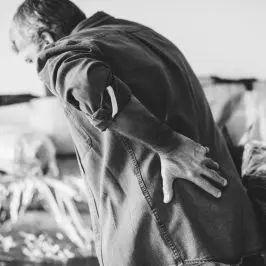Apart from the common cold, what ailment results in the loss of the most working days in Britain each year, forcing five million people to consult their doctor and will cause discomfort at some point in eight out of ten of us? Back pain. Due to the increasingly sedentary nature of our lives, especially in the work place, back pain is replacing the traditional industrial injuries as a reason for sick leave, costing over £600 million a year to employers.
Pain in the back is initially due to an inflammatory response from an injury to the muscles, tendons, ligaments, facet joints, inter-vertebral discs or nerve fibres from the spinal cord. A problem in the back can lead to symptoms elsewhere with pain and pins and needles often being felt in the buttocks, legs or feet of sufferers.
As always prevention is better than cure, and with that in mind here are some general rules that will help to reduce the likelihood of back pain occurring.
1. Keep moving and stretching. The spine is a biomechanical marvel and is designed to move. It works optimally when it is kept mobile allowing the muscles and ligaments to control movement and the discs to perform their role as shock absorbers. Something as simple as walking helps to articulate all the structures of the spine. Pilates and Yoga exercises are better still.
2. Take regular recreational exercise. This should be activity that you enjoy and really is anything that gets you moving – it doesn’t have to mean going to a gym. The increased joint movement whilst exercising stops the spine getting stiff, increasing the blood flow around the tissues and helps to keep the muscles strong.
3. Take frequent breaks between repetitive tasks and vary the rhythm. Such tasks repeatedly place stress on the same tissues around the spine leading to possible strain and injury. Bending forward and twisting places the spine under the most strain, especially when lifting an object. Try and avoid these postures and always bend your knees when picking something up, no matter how light!
4. Change position – avoid ‘computer hump’. A seated posture places twice the amount of pressure on the lowest disc in the spine in comparison to a standing posture, with pressure increasing even further when we slump. Disc injuries can go unnoticed for long periods as only the outer part of the discs have a nerve supply. It is possible to damage the inner part of the disc from prolonged slumped sitting or poor lifting technique; this does not cause pain but predisposes the spine to further more painful injury in the future. Patients often complain of a sudden pain from a seemingly innocuous action, such as picking up a news paper or from sneezing, unaware that this action was the “straw that broke the camels back” as the damage had already been done from poor posture in the preceding weeks or months.
5. Pace yourself when the work is heavy, e.g. gardening. Take frequent breaks where possible. Unfortunately, there are many daily / recreational tasks that involve us having to maintain poor posture that can lead to a back injury. The practice normally gets very busy at the beginning of spring when people start to potter in their gardens once again!
6. Adjust car seats, and on long journeys, have breaks and stretch.
7. Watch children’s posture – don’t let them carry bags on one shoulder. Try not to let bad habits develop early.
8. Stop smoking and lose weight. Smoking reduces the blood supply to the discs resulting in more rapid degeneration.
9. Keep well hydrated. In the middle third of each disc is a jelly like substance that absorbs water to maintain optimal functioning of the disc. This occurs mostly when we move and when we lie in bed at night. It is true that we literally wake slightly taller than when we go to bed! A well hydrated disc wears less quickly and can shock absorb much more effectively.
10. Seek advice from a trained back care specialist, such as an osteopath, sooner rather than later if you start feeling any discomfort.

